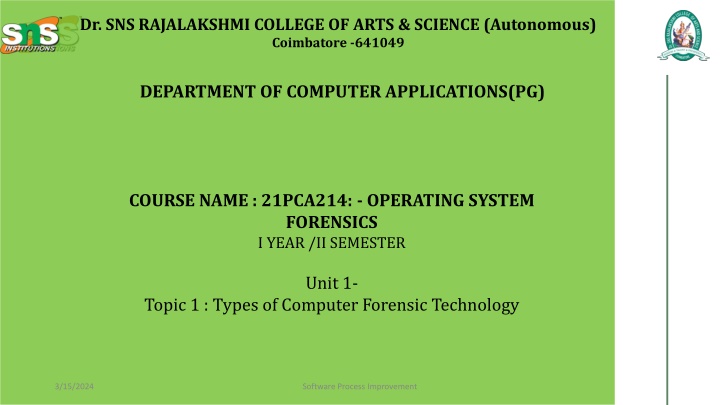
Computer Forensic Technology Overview: Types and Tools
Explore various types of computer forensic technology tools used for investigating digital evidence, such as disk forensics, network forensics, memory forensics, mobile device forensics, cloud forensics, email forensics, database forensics, malware forensics, and IoT forensics. Learn about the importance of these technologies in solving cybercrimes, legal disputes, and data breaches.
Download Presentation

Please find below an Image/Link to download the presentation.
The content on the website is provided AS IS for your information and personal use only. It may not be sold, licensed, or shared on other websites without obtaining consent from the author. If you encounter any issues during the download, it is possible that the publisher has removed the file from their server.
You are allowed to download the files provided on this website for personal or commercial use, subject to the condition that they are used lawfully. All files are the property of their respective owners.
The content on the website is provided AS IS for your information and personal use only. It may not be sold, licensed, or shared on other websites without obtaining consent from the author.
E N D
Presentation Transcript
Dr. SNS RAJALAKSHMI COLLEGE OF ARTS & SCIENCE (Autonomous) Coimbatore -641049 DEPARTMENT OF COMPUTER APPLICATIONS(PG) COURSE NAME : 21PCA214: - OPERATING SYSTEM FORENSICS I YEAR /II SEMESTER Unit 1- Topic 1 : Types of Computer Forensic Technology 3/15/2024 Software Process Improvement
Types of Computer Forensic Technology Types of Computer Forensic Technology Computer forensic technology includes various tools and techniques used to investigate, recover, and analyze digital evidence. These technologies help in solving cybercrimes, legal disputes, and data breaches. 1. Disk Forensics Focuses on examining hard drives, SSDs, and external storage. Recovers deleted, hidden, or encrypted files. Tools: EnCase, FTK (Forensic Toolkit), Autopsy. OPERATING SYSTEM FORENSICS
Types of Computer Forensic Technology 2. Network Forensics Monitors and analyzes network traffic for security breaches. Helps track hackers, data leaks, and cyberattacks. Tools: Wireshark, Splunk, Xplico. 3. Memory Forensics (Live Forensics) Examines RAM and volatile memory for real-time evidence. Recovers running processes, passwords, and malware traces. Tools: Volatility, Rekall, DumpIt. OPERATING SYSTEM FORENSICS
Types of Computer Forensic Technology 4. Mobile Device Forensics Extracts data from smartphones, tablets, and wearable devices. Recovers call logs, messages, GPS data, and app activity. Tools: Cellebrite UFED, MOBILedit, Oxygen Forensics. 5. Cloud Forensics Investigates data stored on cloud platforms like Google Drive, AWS, and OneDrive. Requires legal authorization for remote data access. OPERATING SYSTEM FORENSICS
Types of Computer Forensic Technology 6. Email Forensics Examines email headers, attachments, and metadata. Detects phishing attacks, fraud, and insider threats. Tools: MailXaminer, Paraben Email Examiner. 7. Database Forensics Investigates SQL, NoSQL, and cloud databases for tampering or fraud. Recovers deleted records and transaction logs. Tools: Oracle Audit Vault, ApexSQL Audit. OPERATING SYSTEM FORENSICS
Types of Computer Forensic Technology 8. Malware Forensics Identifies and analyzes malicious software (viruses, trojans, ransomware). Helps in cybersecurity threat detection. Tools: IDA Pro, Cuckoo Sandbox, VirusTotal. 9. IoT Forensics Examines Internet of Things (IoT) devices like smart cameras, wearables, and smart home devices. Investigates security vulnerabilities and unauthorized access. Tools: IoTA, FTK Imager, Autopsy. OPERATING SYSTEM FORENSICS
